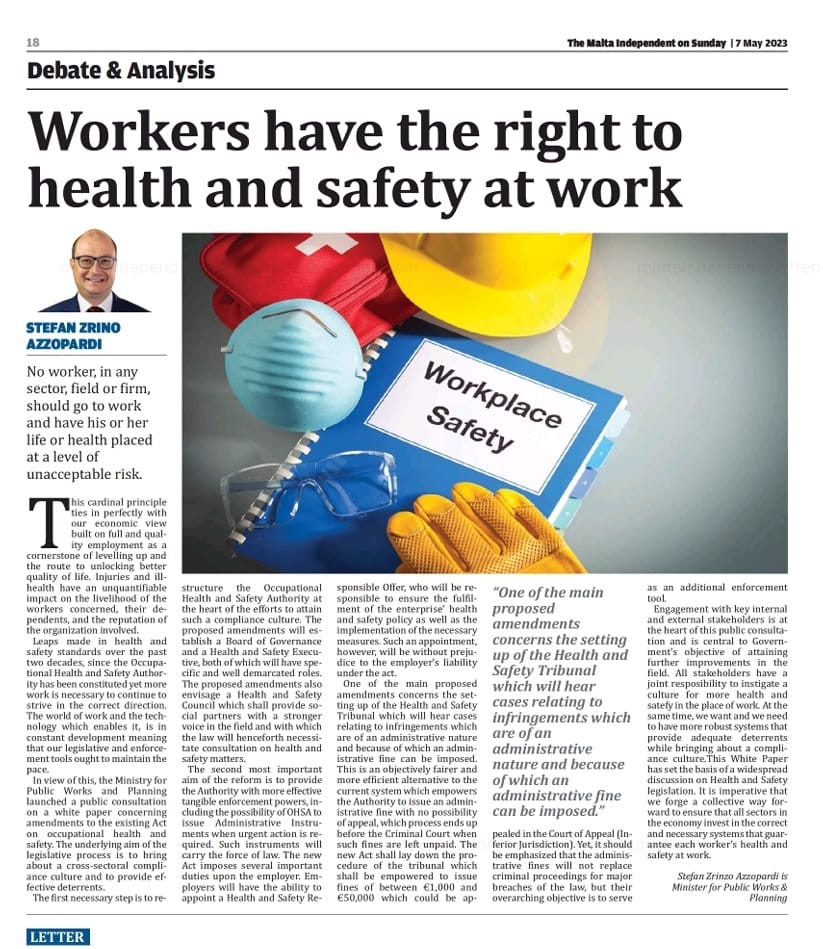No worker, in any sector, field or firm, should go to work and have his or her life or health placed at a level of unacceptable risk.
This cardinal principle ties in perfectly with our economic view built on full and quality employment as a cornerstone of levelling up and the route to unlocking better quality of life. Injuries and ill-health have an unquantifiable impact on the livelihood of the workers concerned, their dependents, and the reputation of the organization involved.
Leaps made in health and safety standards over the past two decades, since the Occupational Health and Safety Authority has been constituted yet more work is necessary to continue to strive in the correct direction. The world of work and the technology which enables it, is in constant development meaning that our legislative and enforcement tools ought to maintain the pace.

In view of this, the Ministry for Public Works and Planning launched a public consultation on a white paper concerning amendments to the existing Act on occupational health and safety. The underlying aim of the legislative process is to bring about a cross-sectoral compliance culture and to provide effective deterrents.
The first necessary step is to restructure the Occupational Health and Safety Authority at the heart of the efforts to attain such a compliance culture. The proposed amendments will establish a Board of Governance and a Health and Safety Executive, both of which will have specific and well demarcated roles. The proposed amendments also envisage a Health and Safety Council which shall provide social partners with a stronger voice in the field and with which the law will henceforth necessitate consultation on health and safety matters.

The second most important aim of the reform is to provide the Authority with more effective tangible enforcement powers, including the possibility of OHSA to issue Administrative Instruments when urgent action is required. Such instruments will carry the force of law. The new Act imposes several important duties upon the employer. Employers will have the ability to appoint a Health and Safety Responsible Offer, who will be responsible to ensure the fulfilment of the enterprise’ health and safety policy as well as the implementation of the necessary measures. Such an appointment, however, will be without prejudice to the employer’s liability under the act.
One of the main proposed amendments concerns the setting up of the Health and Safety Tribunal which will hear cases relating to infringements which are of an administrative nature and because of which an administrative fine can be imposed. This is an objectively fairer and more efficient alternative to the current system which empowers the Authority to issue an administrative fine with no possibility of appeal, which process ends up before the Criminal Court when such fines are left unpaid. The new Act shall lay down the procedure of the tribunal which shall be empowered to issue fines of between €1,000 and €50,000 which could be appealed in the Court of Appeal (Inferior Jurisdiction). Yet, it should be emphasized that the administrative fines will not replace criminal proceedings for major breaches of the law, but their overarching objective is to serve as an additional enforcement tool.

Engagement with key internal and external stakeholders is at the heart of this public consultation and is central to Government’s objective of attaining further improvements in the field. All stakeholders have a joint resposibility to instigate a culture for more health and satefy in the place of work. At the same time, we want and we need to have more robust systems that provide adequate deterrents while bringing about a compliance culture.This White Paper has set the basis of a widespread discussion on Health and Safety legislation. It is imperative that we forge a collective way forward to ensure that all sectors in the economy invest in the correct and necessary systems that guarantee each worker’s health and safety at work.



